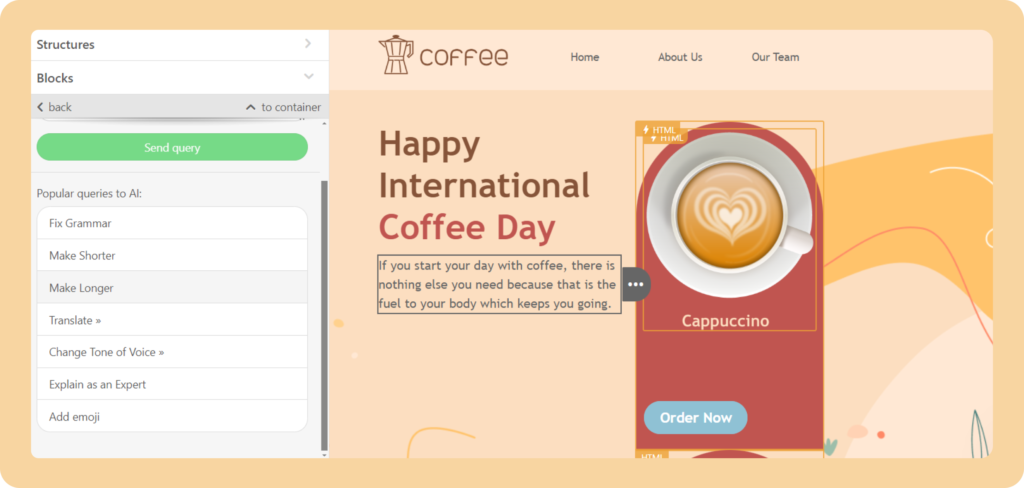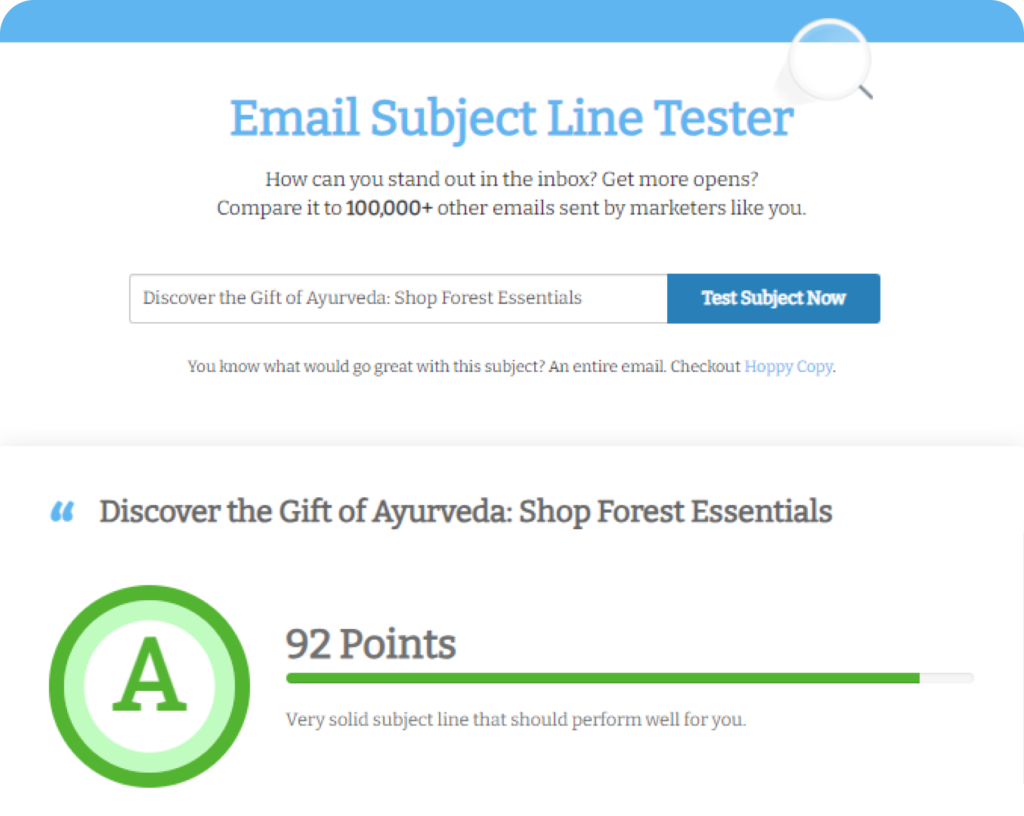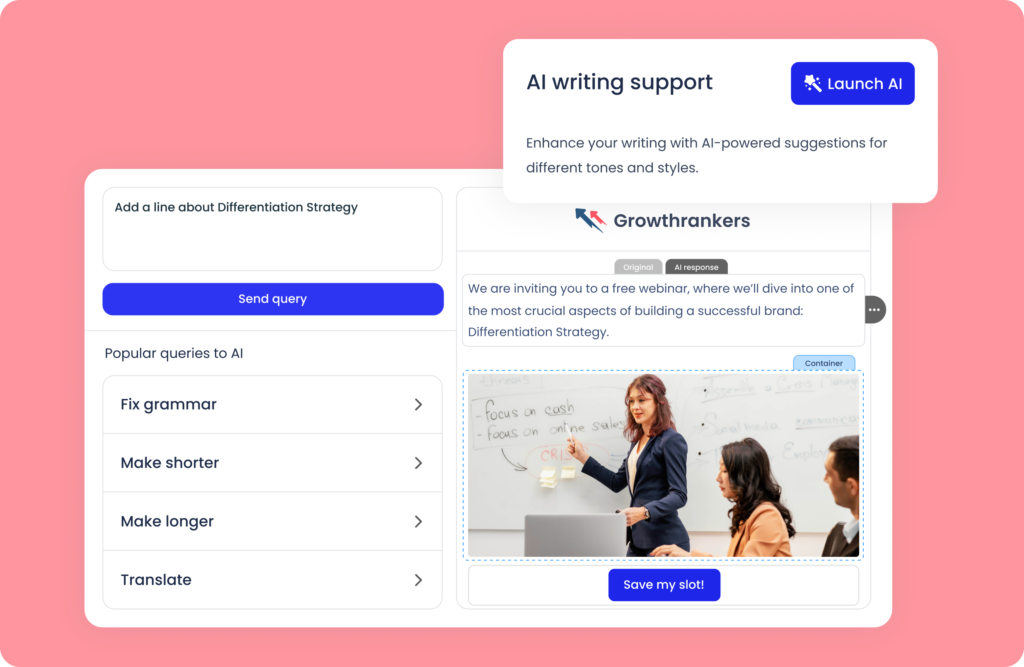Artificial Intelligence is taking over the globe, gradually opening more and more new horizons in marketing for businesses to connect with their audiences in previously unimaginable ways. Of the many uses it has, AI is making brisk headway into the fold of e-marketing, particularly in email marketing, which is probably one of the cheapest and most direct ways to reach any customer.
Almost 51% of email marketers believe that AI-supported email marketing is more effective than traditional methods. With the continuous evolution in technology, so is its potential to take a paradigm leap in changing email marketing concepts. That brings us to this blog on using AI in email marketing to build better campaigns, make personalization sharper, and improve results.
What is AI email marketing?
AI email marketing refers to the state-of-the-art technologies integrated right into an email campaign. This encompasses automated tasks of machine learning and data analytics, personalization of content, and performance optimizations, all to heighten email marketing effectiveness. Because of the voluminous data it processes, AI is able to collate patterns and insights, which are helpful in crafting a message tailored to the individual recipient, making messages more relevant and timely to the audience.
In other words, AI in email marketing magnifies campaign efficiency and effectiveness through the automation of repetitive tasks, thus enabling deep personalization and freeing up marketers to focus more on strategy and creativity, all while technology handles the data-driven portion of campaign execution.
Can AI replace email marketers?
AI itself can’t replace the human marketer, nor does it make a human marketer’s work more productive in email marketing. These tools work very effectively for data analysis, task automation, and content creation based on particular inputs. But they lack the emotional intelligence and empathetic abilities of human marketers. While AI can do data-driven, personalized content creation for an email, that cannot replace the art of storytelling a human marketer would be able to create.
With this, email marketers will be able to humanize their messages through storytelling in an effort to establish consumer trust and loyalty. This is a very key part of email marketing because, beyond personalization of data, it does give a truly much larger way of coming in contact with the audience. As a result, AI will not replace that human touch which is fundamentally needed at the time email marketing campaigns are compiled.
Here is how we have embraced AI in our platform
In addition, we have equipped our drag-and-drop builder with an AI-powered content generator, so that users can create engaging email content much faster and easier than before. Without leaving the editor you can brainstorm new text ideas, generate fresh content, or even refine existing copy.
- Fixing grammar mistakes and adjusting content length.
- Translating texts to multiple languages.
- Alter the tone of your writing to match any style.
- Spice up your content with fun emojis.

Benefits of AI in email marketing
Artificial intelligence in email marketing carries several benefits both in the short and long run. Here are some important advantages:
1. Increased revenue
Advanced technology can be used to improve the return from an email with the running of a more efficient campaign. This is achieved through user data analysis and the personalization of content that will make messages about a certain topic more relevant to the recipient, which in turn may boost conversion rates and sales.
2. Reduction of costs
Automated email marketing solutions reduce costs by freeing up personnel tasks that involve segmentation, content development, and campaign optimization. In a report from Statista last year, 51% of businesses that applied AI in their email marketing campaigns were able to experience service operation cost reductions of more than 20%.
3. Data-driven insights
AI can bring out valued insights from huge chunks of data and identify patterns and trends on which the strategy for email marketing can be based. This shall enable marketers to make a more informed decision and yield better results from their campaigns, saving them from the headache of sending generic mass emails.
4. Scalability
Advanced marketing tools scale business with much more efficiency. With the AI market continuing to grow and projected to reach a value of $118.6 billion by 2025, more brands are turning to such platforms for managing email communications. This is where businesses can scale their recipient list without compromising on quality in the campaigns.
5. Saves time
Automation will be used to save time by doing things such as writing subject lines, even email personalization, and segmentation of an audience. All these important decisions free up more time to be allocated to marketers regarding more strategic aspects of their campaigns that enhance the campaign results.
How AI is revolutionizing email marketing
The application of AI in email marketing is changing the dynamics from more than one perspective. Here are eight key areas where it’s making a difference:
1. Content creation
AI-powered tools will help with everything from idea generation down to email copywriting. Of course, not all of that machine-generated content is going to be on par with human quality, but the time it saves marketers in helping kick-start the creative process is well worth it. Just remember to proofread for accuracy and add a human touch where necessary.
Kasplo has an AI-powered content generator called Launch AI; it will help you generate the content, optimize it, and allow you to personalize this email template without leaving the editor.
2. Creating attention-grabbing subject lines
Arguably, one of the most challenging tasks when sending emails is to actually make your subject lines capture the attention of the recipient. For example, Tools like Encharge can generate engaging subject lines, and platforms like subjectline.com, and sendCheckIt can test these lines to help marketers select the most effective one. It quotes as saying that using AI in writing subject lines alone can increase open rates by as much as 5-10%.

Source: Encharge

3. Personalization of content in emails
The secret of any successful email marketing campaign lies in personalized communication. Advanced tools raise this to the next level by analyzing user data and developing highly targeted content for each recipient. For example, a business can send personalized product recommendations to a customer based on his browsing history or products bought in the past.
For instance, with Kasplo launch AI you can personalize introductions in emails using updates from social networks, job postings, or any other publicly available information.

4. Automating repetitive operations over emails
More often than not, automation can replace repetitive tasks carried out by email marketers manually. For example, AI cleans email lists, removes outdated contacts, and automatically updates information with the aim of improving deliverability. AI automates email segmentation to ensure contacts fall into categories based on their purchase history, browsing behavior, and more. This way, each recipient opens content relevant to their interest.
5. Personalization in customer success
Artificial intelligence can play a major role in enhancing customer success by helping businesses understand the concept of the customer lifecycle. AI is able to detect potential clients, know how to engage them, and also re-engage your already existing customers to maintain brand loyalty. In addition, AI may help marketers restructure their email campaigns to ensure maximum inbox delivery, including the timing and frequency of abandonment emails triggered on items left in carts.
6. Delivered campaign insights
Artificial intelligence can play a major role in enhancing customer success by helping businesses understand the concept of the customer lifecycle. AI is able to detect potential clients, know how to engage them, and also re-engage your already existing customers to maintain brand loyalty. In addition, AI may help marketers restructure their email campaigns to ensure maximum inbox delivery, including the timing and frequency of abandonment emails triggered on items left in carts.
7. Automating email list cleanup
The AI will automatically clean up email lists by removing low-quality and active email addresses, making sure campaigns reach a relevant audience. This includes validity confirmation of email addresses and analysis based on engagement metrics to decide which contacts to keep.
8. Smart segmentation enabled
AI will elevate email segmentation by analyzing data on grouping customers in accordance with behavior and preference, among other characteristics. It simply means that the marketer can only send targeted emails for better engagement and conversion rates.
AI with email marketing best practices
While there is a lot that AI can promise, using the system judiciously at all times is relevant for extracting maximum benefit. Some of the best practices for driving AI in email marketing campaigns are discussed herein.
1. Use good data
AI needs more updated and correct information to deliver results. Information should always be clean, updated, and collected from acceptable and ethical sources in such a way that it further feeds the AI for more exact predictions and valuable insights.
2. Balance automation with a human touch
Now that AI can automate so much of the email campaign, it is very important to remember, always staying in touch with the human feel of those campaigns. Periodically go through your emails and ensure they sound realistic and will actually resonate with your audience. AI is here to augment your marketing effort—not to replace human creativity and empathy.
3. Periodic observation and campaign adjustment
AI is dynamic; it learns from new data. Therefore, with the passing of time, it becomes less effective. Keep a watchful eye on your campaigns and make adjustments whenever possible to derive the desired results. Use this flow of performance data to constantly fine-tune your AI inputs and settings to keep your email strategy on target.
4. Ensure both privacy and compliance
As you integrate AI into email marketing, the data protection laws of GDPR and CCPA have to be followed. Let transparency in the methods of collection and usage show by stating clearly what it collects and for what use. After that, follow the privacy regulations set during the runs of your campaigns that involve AI. This way, you will gain better trust from the customers of your brand and save its image.
5. Predictive Analytics
AI, when conducting the email marketing process, is definitely going to make predictions of future customer behavior and trends much easier. Let AI project who does what in the future so that you may timely deliver appropriate offers and content, keeping you ahead of your customer’s needs and further improving your campaigns.
Wrap up
This greatly pushes email marketing to new heights with advanced personalization, automation, and insight-driven decision-making. AI certainly takes the place of absolutely no human marketer; rather, it extends the capacity and capability of the human marketer to make an email campaign that much more effective. Equipped with AI, an organization is able to create emails that are much more personalized, relevant, and timely. Thus, these can resonate better with an audience and yield superior results. This AI technology is going to adapt and take email marketing to newer levels with each passing day, which again emphasizes the possibility of its revolution in transforming email marketing. The reason being, it will be indispensable from any modern marketing strategy.




